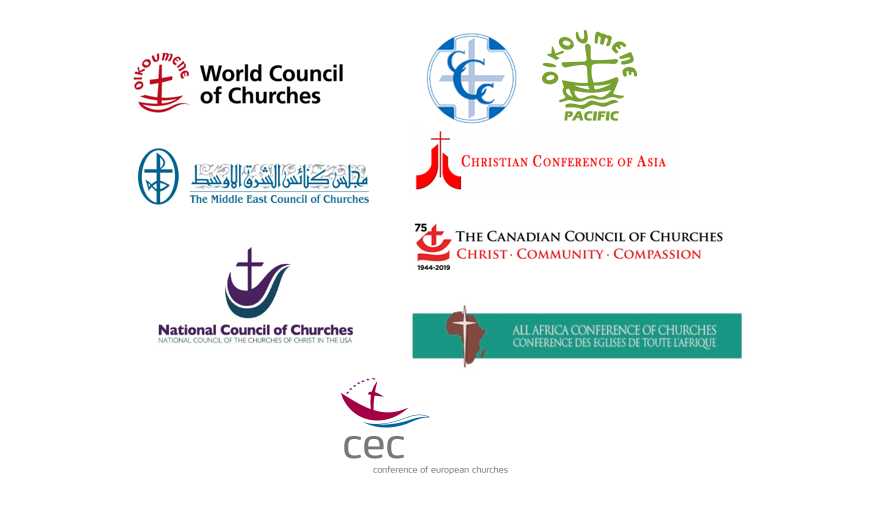A Time for Pastoral, Prophetic and Practical Christianity: A Joint Statement from the World Council of Churches and Regional Ecumenical Organizations
Blessed be the God and Father of our Lord Jesus Christ...who consoles us in all our affliction, so that we may be able to console those who are in any affliction with the consolation with which we ourselves are consoled by God.
(2 Cor. 1:3-4)
As representatives of Regional Ecumenical Organizations and the World Council of Churches, we share the challenges that our communities around the world are facing due to the coronavirus, COVID-19.
We urge people everywhere to give highest priority to addressing this situation and assisting in whatever ways we can in our collective efforts to protect life. This is a time to touch each other’s hearts, by what we say, share, and do – and by what we are unable to do—to protect the life that God created out of love.
For the sake of that love, it is important and urgent that we adapt our modes of worship and fellowship to the needs of this time of pandemic infection, in order to avoid the risk of becoming sources of viral transmission rather than means of grace.
Our faith in the God of life compels us to protect life by doing all that we can to avoid transmitting this virus. Let us manifest God’s unconditional love in safe, practical ways that protect life, alleviate suffering, and ensure that churches and public services do not become hubs of transmission of the virus.
Physical distancing does not mean spiritual isolation. This is an opportune time for the churches all over the world to review their role in society by safely ministering to, providing for, and caring for the poor, the sick, the marginalized, and the aged –all those who are most at risk due to COVID-19.
People in many parts of the world have become homebound these days. Being homebound does not mean that we cannot experience a deep spiritual solidarity with each other, by virtue of our baptism into the one body of Christ. We can pray at home. We can give thanks to God and pray for strength, healing, and courage. We can show our love for God and our neighbour by not gathering in person for public worship. Many congregations can share their worship gatherings online or digitally. Members and pastors can also stay in touch with each other and provide pastoral care by telephone.
The novel coronavirus pandemic has reached all the regions of our planet. There are fear and panic, pain and suffering, doubt and misinformation, about both the virus and our response as Christians. Yet as a global community of faith, we affirm that, even in the midst of our vulnerability, we trust in God as God is our hope.
Amid stories of suffering and tragedy, there are also stories of simple kindness and extravagant love, of solidarity and the sharing of hope and peace in innovative and surprising ways.
During this Lenten season, our pilgrimage takes us through the desert of hardships, difficulties, and temptations, from death to resurrection, into a new life with God.
This desert is made more hostile and fearful by COVID-19, but we are called to join our hearts in solidarity with each other, to mourn with those who mourn, to share peace with those who are anxious, and to restore hope through solidarity in faith.
That human solidarity is eroded and anxiety is heightened when we are in panic and concentrate on shopping and hoarding the basics. In so doing, we fail to be instruments of God’s grace in this season.
We recognize the need for responsible leadership by the state, communities, and faith leaders alike. Governments at all levels must ensure access to correct and timely information, address the situations due to loss of livelihood and employment, especially to provide access to clean water and sanitizers and soap, to safe shelter, and to compassionate care for the most vulnerable, while aware that some of these remain challenges for many across the globe. This is also a time for profound reflection on the common good, good governance, and ethical values rooted in our traditions.
In the midst of this grave crisis, we lift up our prayers for those providing leadership and for governments around the world, urging them to give priority concern to those who live in poverty, as well as to the marginalized and refugees living in our midst.
As religious leaders, we raise our collective voices to highlight the necessity for greater attention to the needs of the homeless, the incarcerated, the elderly and those already suffering from social isolation. We remember, too, those people, especially women and children, who face abuse and violence, who are not safe at home and may suffer additional abuse and violence as stress increases.
Finally, let us continue to pray for those infected with COVID-19, for their families, and for the medical staff and health workers who risk their lives to provide treatment and prevention for us. And let us pray also for public health officials, who, we hope, will be able, with God’s help and our cooperation, to contain the spread of the virus and prevent grave social, economic, and environmental consequences.
God’s love is all-embracing, and the God of life is with each of us, even in our suffering.
26 March, 2020
Rev. Dr Olav Fykse Tveit, General Secretary, World Council of Churches
Dr Souraya Bechealany, General Secretary, Middle East Council of Churches
Rev. James Bhagwan, General Secretary, Pacific Conference of Churches
Dr Mathews George Chunakara, General Secretary, Christian Conference of Asia
Gerard Granado - General Secretary, Caribbean Conference of Churches
Rev. Dr Fidon Mwombeki, General Secretary, All Africa Conference of Churches
Pastor Peter Noteboom, General Secretary, Canadian Council of Churches
Dr. Jørgen Skov Sørensen, General Secretary, Conference of European Churches
Jim Winkler, General Secretary, National Council of the Churches of Christ in the USA

